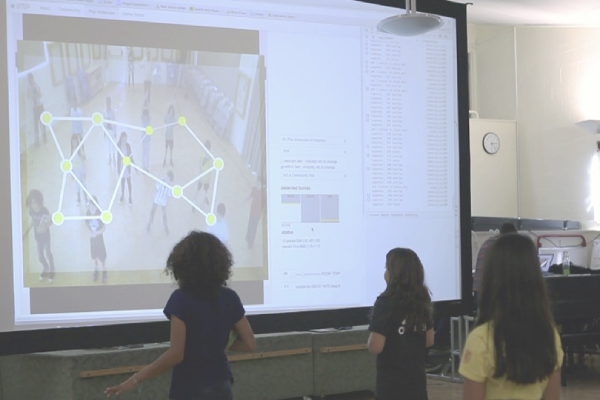Vanderbilt launches Future of Learning and Generative AI Initiative and interdisciplinary advisory board
Vanderbilt University has created the Future of Learning and Generative AI Initiative and appointed members of an advisory board for the initiative. Both will center their efforts around scholarship and opportunities connected to the growing use of nascent artificial intelligence technologies.
As generative AI grows and evolves, so do its uses and best practices. The purpose of the initiative is to take the opportunity to explore them and to train Vanderbilt students, faculty and staff to leverage the best of this cutting-edge technology.
The initiative’s interdisciplinary advisory board members bring expertise from history, music, bioinformatics, physics, otolaryngology-head and neck surgery, law, nursing informatics, data science, psychology and human development, and the humanities.
Using AI at Vanderbilt to treat and prevent diseases
- A Vanderbilt computer scientist is working with key clinical collaborators at Vanderbilt University Medical Center to develop an AI-empowered 3D computer vision tool to better diagnose kidney diseases. For this project, the researchers were awarded a five-year, $2.7 million grant from the NIH.
- Vanderbilt researchers are part of the Mid-TN AI for Interdisciplinary Imaging Interpretation Alliance, which is supported by the NSF. The alliance seeks to build on the use of AI in medical imaging in Middle Tennessee. The alliance expects to work on imaging problems in radiology, neurology and neuroscience, cell microscopy, ecology and remote sensing, transportation, materials engineering, archaeology, digital anthropology, and theory problems around deep networks.
- Neuroscientists and engineers have partnered to create an automated tool that can link brain scans to cognitive deficits in people with neurofibromatosis 1.
- Vanderbilt researchers, in collaboration with the NIH and the Institut National de Recherche Biomédicale in the Democratic Republic of the Congo, are developing an AI algorithm that can precisely track and count monkeypox lesions.
- A team led by Vanderbilt researchers have developed an active machine learning approach to predict the effects of tumor variants of unknown significance, or VUS, on sensitivity to chemotherapy. VUS, mutated bits of DNA with unknown impacts on cancer risk, are constantly being identified.
NSF unveils $20 million AI institute with Vanderbilt and partner institutions
Vanderbilt University engineering and education faculty are part of a new $20 million research institute funded by NSF that aims to create artificial intelligence tools to advance human learning and education. The NSF AI Institute for Engaged Learning is part of a major initiative to advance understanding of AI technologies and how they can drive innovation to address real-world challenges. The researchers will develop narrative-centered AI platforms and characters, or agents, to interact with and support a wide variety of learners. The institute will create a sophisticated framework that analyzes data from interactions to evaluate what works and what needs refinement to make the tools truly interactive and adaptive to the learning needs of individuals and of collaborating groups.

Using AI for education and training environments
An engineering professor at Vanderbilt University has developed a method of collecting and analyzing data to gain insights into how students learn and how trainees perform. By gathering information such as computer clicks, hand gestures, eye gaze position and speech, and applying artificial intelligence and machine learning algorithms, he aims to provide feedback to learners and instructors and to improve learning tools designed by curriculum and simulation experts.
The technology captures important details such as student focus, activity and interaction, which instructors may not be able to observe in real-time or recall later. The purpose of the technology is not to replace the instructor, but to provide them with more detailed information to give constructive feedback to their students. This approach empowers instructors to make the learning process more effective and contextualized. This model has been widely tested on first-year nursing students, U.S. Army soldiers and a middle school science class. This work in K-12 education falls under the $20 million National Science Foundation AI Institute for Engaged Learning.
Service providers charged with keeping kids safe are cautious but see value in AI tool to track risky behavior online
As part of the National Science Foundation I-Corps program, a team of researchers conducted interviews with 37 social service providers across the United States who work with underprivileged youth to determine what online risks most concern them and if they see value in using AI as a solution for automated online risk detection. The respondents included children, youth and family services workers, mental health therapists, teachers, juvenile justice officers, an LGBTQ+ advocate, a government consultant and police officers.
The study offers detailed responses from the distinct types of SSPs that indicate risk detection technology needs to recognize the differences in end-user views and that would affect model design. SSPs prefer a tool that prioritizes and filters risks like sexually risky behavior and cyberbullying but also takes into account the differences in SSP duties. There is an interest among SSPs in online risk detection technology because they rely predominantly on self-disclosure and tip-offs and they view it as useful as conversation starters, but not to surveil and report on kids in their care.

Vanderbilt launches free course: Prompt Engineering for ChatGPT
Jules White, associate dean for strategic learning programs and associate professor of computer science at Vanderbilt University, is making ChatGPT more accessible and useful for the broader public with the launch of his free online Prompt Engineering for ChatGPT course on the Coursera platform.
Prompt engineering, the process of crafting high-quality inputs to generate high-quality outputs, is an increasingly crucial skill as large language models like ChatGPT rise in popularity.
Vanderbilt computer science professor leads DARPA project to improve machine learning
An assistant professor of computer science in the School of Engineering received a DARPA award to seek ways to improve statistical modeling of machine-learning systems’ outputs. The $875,000 grant, part of DARPA’s Artificial Intelligence Exploration Opportunity on Enabling Confidence, focuses on scalable methods to generate accurate statistical models for the outputs of machine-learning systems and allows for computationally efficient and rapid propagation of input uncertainties into the output of ML systems. The goal is to advance fundamental research and apply the team’s cutting-edge tools to critical applications, such as surgical operations.
That same professor was awarded another grant from DARPA for $1 million to create advanced artificial intelligence programs that will enable machines to learn progressively over a lifetime and share those experiences with each other. The prototype project received the award as part of the agency’s Shared-Experience Lifelong Learning initiative. DARPA wants to develop AI agents that share their experiences with each other and is seeking innovative basic or applied research concepts in lifelong learning. The real-world uses of this new technology could include cooperating self-learning autonomous vehicles such as self-driving cars, robotic rescue and exploration systems, distributed monitoring systems to detect emergencies, or cybersecurity systems of agents that monitor large networks.
The Future of AI Governance
The Vanderbilt Policy Accelerator for Political Economy and Regulation published a series of polling and papers on the regulation of AI, which has captured the nation’s attention since the release of ChatGPT more than a year ago. VPA outlines an antimonopoly approach to AI regulation, with public utility regulations, industrial policy tools and a public AI option.
VPA polling found widespread, bi-partisan support for breaking up big AI companies, regulating companies that control cloud computing processing power as public utilities, and a publicly run cloud computing system.
VPA is part of Discovery Vanderbilt, a groundbreaking initiative to bolster innovative research and education at Vanderbilt. VPA’s innovative work in AI regulation embodies VU’s commitment to shaping technology policy and addressing global challenges through transformative research.
For more information, please contact the Vanderbilt Office of Federal Relations:
Christina West 202-216-4370 | Heather Bloemhard 202-216-4368
federalrelations@vanderbilt.edu
FY 2023